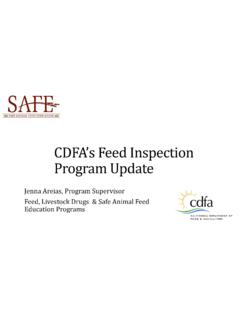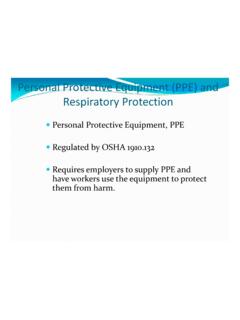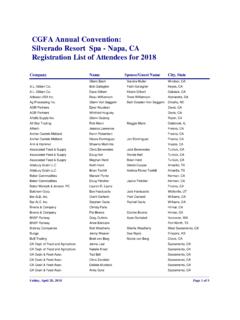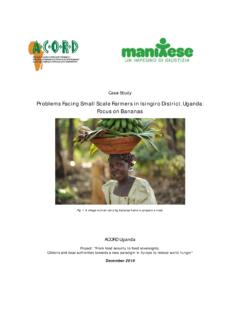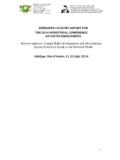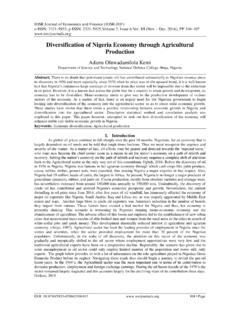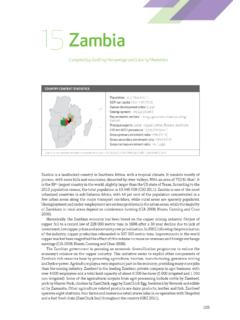Transcription of 2015 CGFA Annual Convention
1 2015 cgfa Annual ConventionThe Monterey Plaza Hotel and Spa MontereyIdentifying and Managing Counterparty RiskTodd P. LangelFaegre Baker Daniels LLPA pril 23, 2015 Identifying and Managing Counterparty RiskOverview Commodity contract formation and enforcement primer Merchant Farmer/user purchases and sales Merchant Merchant transactions Sorting through the fine print Battle of the Forms Identifying Default Failure to deliver or take delivery during contract windowRepudiation breach before performance is due Cancellation and Determination of Damages Arbitration or Litigation2 Contract formation General Concepts UCC 2-204(1)
2 A contract for sale of goods may be made in any manner sufficient to show agreement, including conduct by both parties which recognizes the existence of such a contract. Issues of enforceability often arise in association with a grain contract dispute. Procedural deficiencies related to the enforceability of a grain contract are easily of an Oral Agreement NGFA Grain Trade RulesThe NGFA Grain Trade Rules state the proper procedure for the entry into an oral agreement and the subsequent issuance of a written confirmation to form an enforceable contract. Rule 3, NGFA Grain Trade Rules, states:(A)Both the Buyer and Seller shall send a written confirmation, each to the other, not later than the close of the business day following the date of trade, or an agreed amendment, setting forth the specifications as agreed upon in the original articles of trade, or an agreed amendment.
3 Upon receipt of said confirmation, the parties shall carefully check all specifications therein and, upon finding any material differences, shall immediately notify the other party to the contract, by telephone and confirm by written communication. In the case of minor differences, notification may be by either telephone or written communication.(B)If either the Buyer or the Seller fails to send a confirmation, the confirmation sent by the other party will be binding upon both parties, unless the confirming party has been immediately notified by the non-confirming party, as described in Rule 3(A), of any disagreement with the confirmation received.
4 Electronic confirmations are approved NGFA Rule 54 Confirmation of an Oral Agreement Uniform Commercial CodeNGFA Trade Rule 3 tracks the Uniform Commercial Code (UCC), which is generally applicable to grain contracts. Confirmations are specifically addressed in three sections of the UCC, namely Sections 2-201, 2-202, and 2-207. Section 2-207 provides for the inclusion of additional terms in a confirmation as proposals for addition to the terms of the parties contract ( , standard terms and conditions stated on the reverse side of the confirmation). Section 2-202 precludes the introduction of evidence contrary to terms set forth in writing between the parties (if the confirmation states a price of $ , seller is prevented from introducing evidence of a promise to pay $ ).
5 5 Section 2-201 and the Statute of Frauds The Statute of Frauds refers to the legal requirement that certain types of contracts be in writing to be enforceable. With respect to contracts for the sale of goods, which includes contracts for the sale of grain, California Commercial Code 2201 provides:A contract for the sale of goods for the price of five hundred dollars ($500) or more is not enforceable by way of action or defense unless there is some record sufficient to indicate that a contract for sale has been made between the parties and signed by the party against which enforcement is sought or by his or her authorized agent or , 2201 goes on to make a special provision for a certain category of buyer and seller, the merchant, stating.
6 Between merchants if within a reasonable time a record in confirmation of the contract and sufficient against the sender is received and the party receiving it has reason to know its contents, it satisfies the requirements of subsection (1) against the recipient unless notice of objection to its contents is given in a record within 10 days after it is confirmations are acceptable in most states, including California. 6 Farmer as Merchant Merchant" means a person who deals in goods of the kind or otherwise by his occupation holds himself out as having knowledge or skill peculiar to the practices or goods involved in the transaction or to whom such knowledge or skill may be attributed by his employment of an agent or broker or other intermediary who by his occupation holds himself out as having such knowledge or skill.
7 California Commercial Code 2104 (1).In most states, the status of a farmer as a merchant is a question for the trier of fact. The trier of fact may consider evidence length of time the farmer has been engaged in the practice of selling his product to the marketers of his product; degree of business acumen shown by the farmer in his dealings with other parties; farmer's awareness of the operation and existence of farm markets; and farmer's past experience with or knowledge of the customs and practices which are unique to the particular marketing of the product which he as Merchant: Case Law Examples Iowa: Annual sales by a farmer of his own crops will not alone give rise to a finding that a farmer is a merchant.
8 Sand Seed Service, Inc. v. Poeckes, 249 663 (Iowa, 1977). Nebraska: experienced grain producers who regularly grow and market grain on the open market as the principal means of providing for their livelihood .. possess knowledge or skill peculiar to the practices and operations of grain marketing, are merchants .. Agrex, Inc. v. Schrant, 379 751, 754 (Neb. 1986). Tennessee: In considering the questions at issue, the Court notes that cases which hold that the farmer is [a] merchant reflect on the fact that today's farmers are involved in far more than simply planting and harvesting the Court is persuaded that.
9 Today's Tennessee farmer possess an extensive knowledge and sophistication regarding the purchase and sale of crops. Brooks Cotton Co., v. Williams, 381 SW 3d 414 (Tenn. 2012). California: Sellers of animal feed and hay exports to customers in Korea, and commodity merchandiser specializing in cottonseed were all considered to be Merchants under Cal. U. Com. Code 2104. Apex LLC v. Sharing World, Cal. App. 4th999 (California 2012).8 Farmer as Merchant: Hypotheticals Ma & Pa Dairy have day jobs and 25 cows and rely primarily on feed and supplements from their local farm store. Pa decides to forward contract for 3-months worth of DDG s from a local ethanol Pa a merchant?
10 ABC Dairy Farm, LLC, has for the last 20 years operated a 2,000-head dairy operation. ABC buys custom-manufactured pellets from XYZ Feed Mill, LLC, but periodically makes forward contract purchases of bulk commodity ingredients through XYZ for risk management purposes. Is ABC a merchant?What if ABC forward contracts for 100 tons of canola meal pellets, but has never purchased canola meal pellets before?What if ABC engages the services of a broker for the transaction?(1) "Merchant" means a person who deals in goods of the kind or otherwise by his occupation holds himself out as having knowledge or skill peculiar to the practices or goods involved in the transaction or to whom such knowledge or skill may be attributed by his employment of an agent or broker or other intermediary who by his occupation holds himself out as having such knowledge or practices for transactions with Non-Merchants Properly identify the party.


